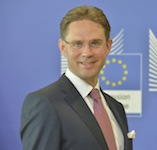
The European Union is becoming a significant actor in defence and security
At a time when terrorism, cyber and hybrid threats, climate change, economic volatility and energy insecurity endanger European people and territory, closer cooperation on defence and security is more important than ever.
While Member States remain in the driving seat and are responsible for deploying security and armed forces when needed, there is increasing awareness that new types of threats are best prevented and tackled by working together.
And a majority of Europeans indeed wants more Europe in defence.
The changed geopolitical landscape was a wakeup call for Europe: we Europeans have to take responsibility for protecting our interests and the European way of life. European governments have responded to this call, and so has the European Commission.
The past two years have been historical for the European Union and EU defence, both for military leaders and for the defence industry.
Never before have we had such a political consensus for increased cooperation in this domain.
At the political level, 25 Member States, almost the entire EU, have committed to increase cooperation in defence and joined the Permanent Structured Cooperation, PESCO, to achieve better coordination and join forces in a number of projects cooperate to develop defence capabilities.
While this is a Member State led process, the Commission is devoted to support Member States and help them with the projects, for what is in its competence.
The European Commission has also undertaken the historical step of presenting for the first time, a proposal for a programme financed with the EU budget, in support of the competitiveness and innovation of the European defence industry.
Launched in November 2016, the European Defence Action Plan has set an ambitious agenda to support Member’s State’s more efficient spending in joint defence capabilities, foster a competitive industrial base and ultimately support the long term strategic autonomy of the European Union.
The Action Plan is centred around the launch of the European Defence Fund, the Commission’s contribution to a stronger European defence.
The Fund supports collaborative defence research and development in order to foster the competitiveness and innovation of the defence industry in the EU and to deliver on the capabilities that Europe needs for its security.
Ensuring that our industrial base is able to meet future security needs is crucial to achieve European strategic autonomy.
The role of the defence industry is central to achieve strategic autonomy. The persisting fragmentation of European defence markets leads to unnecessary duplication of capabilities, organisations and expenditures.
As a result, the European defence industry is currently lacking the necessary economies of scale and risks losing critical expertise and autonomy in key capability areas.
Fragmentation and duplications make the investment in defence inef- ficient, innovation slower and hence Europe less safe. Therefore, we need to invest in collaboration, since it frees up resources, opens up markets and encourages innovation.
The Commission’s role is to support industrial cooperation and smooth functioning of the single market as well as research and development on defence.
Defence, like any other industrial sector, is now more technological, more advanced and more research-centred than ever.
We know that the resources needed to fulfil one single need are nowadays much bigger than they used to be twenty years ago.
Therefore, cross-border cooperation in defence research and development has become unavoidable for Europe.
Cooperation is already bearing fruit: the first cross-border research projects to be funded by the EU have been recently selected through a competitive procedure.
The industrial programme to co-finance the later stages in the development of defence capabilities is under discussion between the European Parliament and Council and will soon become a reality.
For the next financial period the European Commission will present an even more ambitious proposal to devote more than 10 billion euros from the EU budget for research and for capability development.
In parallel, we are working to provide Member States with a set of financial tools which they could use for joint procurement or joint acquisitions.
European defence is not about spending more, but about spending in a better and more efficient way, together.
We have to think further collectively. We need to be more efficient and innovative in our defence industry and ensure the best possible conditions for cross-border cooperation, thereby providing better security for our citizens.
The EU’s role in European defence will remain a complementary one: Member States will continue to be the decision-makers on defence and military issues.
However, better cooperation and coordination among Europeans is not an option, but a necessity, if we want to remain relevant on the global stage. It is central to ensure security of the whole continent.




